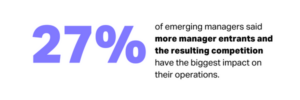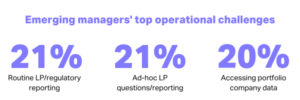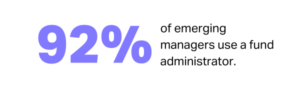
By: James DiCostanzo
Sales Director
July 17, 2023
As volatility has hit the investment space at large this year, the private markets have been viewed as a haven from the chaos. It’s a positive sign for private capital managers, but as manager competition has continued to grow, emerging managers in particular are likely feeling the pressure to stand out and offer a premium investor experience.
Allvue recently surveyed a group of GPs to learn about the challenges and plans for growth in the current market environment. Emerging managers (AUM under $2.5B) made up more than half of the group. Here are the key trends that emerge after a closer look at emerging manager-specific data.
DOWNLOAD: DATA REPORT – Meeting the Market Moment
Trend 1 – Broad manager competition is affecting emerging managers

According to Allvue’s data, 27% of emerging managers said that more manager entrants to the space and the resulting competition had the biggest impact on their operations – the most-cited challenge among this group.
GPs of all sizes heavily cited growing competition as well as plans to expand into new asset classes, so it’s clear this pressure of competition is permeating private markets broadly. However, it certainly affects emerging managers heavily as they work to get their brand established with fewer resources and less AUM than their larger counterparts.
With this in mind, emerging managers can set themselves apart to LPs by investing in their operations to streamline processes like accounting and investor reporting, helping them focus in on finding private equity deals and fundraising. Plus, it will sharpen their investor experience, creating loyal investors that stick around for many fundraising cycles.
Trend 2: Data challenges are present across emerging managers’ operations

When asked for the top challenge that affects their operations, over half of the emerging manager audience split between three data-themed options:
The presence of each option might even say more about LPs than it does about emerging managers. Investors increasingly expect an ongoing two-way exchange of investment information, and emerging managers – as with larger GPs – are struggling to keep pace. Access to desired data is a key element of the investor experience, however, and GPs, large or small, will have to meet this expectation by implementing the right software and workflows.
Trend 3: Emerging managers overwhelmingly choose to outsource their accounting and reporting needs

Insourcing versus outsourcing the accounting and reporting function is often a key discussion for smaller or newer private capital managers. Our survey shows that outsourcing is overwhelmingly the chosen way to go for emerging managers, as 92% say they use a fund administrator.
By outsourcing these back-office functions, they can afford to keep headcount and costs low while also putting more of their focus and resources into front-office tasks like fundraising and dealmaking. Of course, when outsourcing the accounting and reporting functions, some tradeoffs do arise, such as loss of direct access to the fund’s books, or the decision to duplicate efforts by keeping a set of shadow books to check the fund admin’s work and have these numbers ready to reference at a moment’s notice. In cases like these when emerging managers get stuck on the cons of both insourcing and outsourcing, co-sourcing can offer a middle ground, whereby the manager selects their own accounting and reporting software and brings in a fund administrator who performs the work directly on the manager’s own systems, negating the challenge of losing control of accounting data.
DOWNLOAD WHITEPAPER: CO-SOURCING: A WIN-WIN FOR FUND MANAGERS
Overall, Allvue’s data shows that emerging managers are facing significant challenges in the current private market environment – particularly on the data management front. But with the right choices made for their operations and tech stack, they can solidify their place in this industry and continue to grow and find new avenues of business and growth.
To learn more about Allvue’s solution sets purpose-built for emerging managers, check out our Equity Essentials page or watch Allvue’s software in action.
More About The Author

James DiCostanzo
Sales Director
James DiCostanzo is a global sales leader with over 20 years of experience in the financial, private equity and SaaS industries. He is currently the Global Head of Growth Equity Sales at Allvue Systems, a leading provider of investment management solutions. He joined Allvue Systems in March 2020 as the Head of Sales for the East Region, after working at Thomson Reuters for nearly two decades in various roles, including Head of Solution Specialists, Data & Analytics and Global Business Director. He has a bachelor’s degree in Business/Managerial Economics from SUNY Oneonta. He is based in the New York City Metropolitan Area and can be found on LinkedIn at https://www.linkedin.com/in/jamesdicostanzo/.





